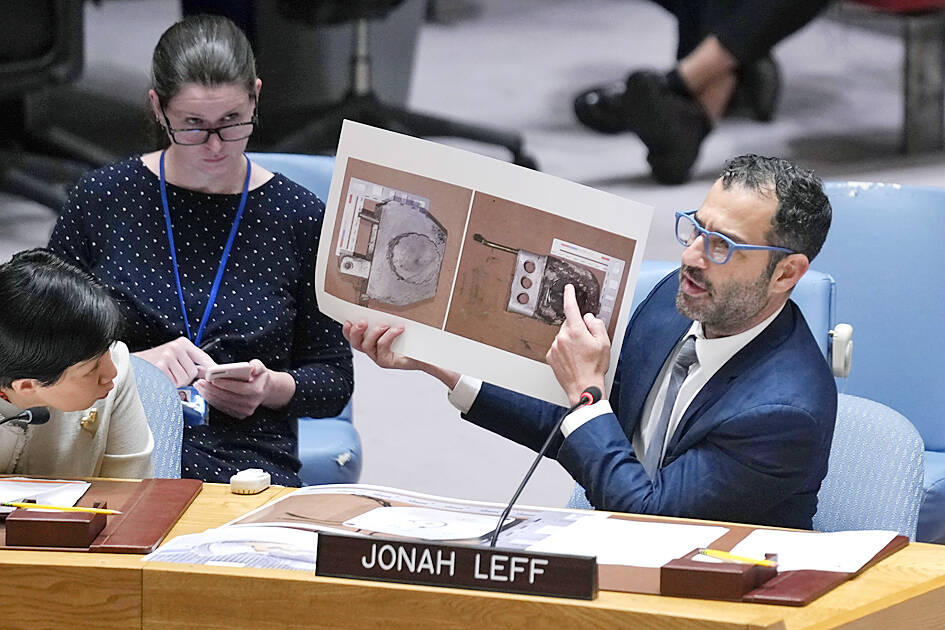The head of a research organization that has been tracing weapons used in attacks in Ukraine since 2018 on Friday told the UN Security Council it has “irrefutably” established that ballistic missile remnants found in Ukraine came from North Korea.
The US and its Western allies clashed with Russia and North Korea at the meeting, saying both countries contravened a UN embargo on arms exports from the Democratic People’s Republic of Korea (DPRK), the country’s official name.
Russia dismissed the “baseless accusations,” and North Korea dismissed the meeting as “an extremely brazen act” to discuss “someone’s alleged ‘weapon transfers.’”

Photo: AP
Jonah Leff, director of operations at Conflict Armament Research, gave the council a detailed analysis of the remnants of the missile that struck Ukraine’s second-largest city, Kharkiv, on Jan. 2.
The organization documented the missile’s rocket motor, its tail section and almost 300 components manufactured by 26 companies from eight countries and territories, and determined the missile was either a KN-23 or KN-24 manufactured last year in North Korea, Leff said.
The organization reached its conclusion based on the missile’s unique characteristics — its diameter, distinct jet vane actuators that direct the missile’s thrust and trajectory, the pattern around the igniter, the presence of Korean characters on some rocket components, and other marks and components dating back to last year, he said.
“Following the initial documentation, our teams inspected three additional identical DPRK missiles that struck Kyiv and Zaporizhzhia earlier this year,” Leff said.
The council discussed illegal arms transfers from North Korea at the request of France, Japan, South Korea, the UK and the US.
The meeting followed Russia’s March 28 veto that ended the monitoring of sanctions against North Korea over its expanding nuclear program by a UN panel of experts. The US and its European and Asian allies accused Moscow of seeking to avoid scrutiny as it allegedly contravenes sanctions to buy weapons from Pyongyang for its war in Ukraine.
US Deputy Ambassador to the UN Robert Wood called Leff’s presentation with its many technical details “quite compelling,” and told the council that while Russia might have ended the panel’s monitoring with China’s “tacit support,” the briefing showed that Moscow and Beijing “cannot prevent the public from learning about the unlawful arms transfers occurring between the DPRK and Russia.”
Russian Ambassador Vassily Nebenzia accused the meeting’s Western sponsors of attempting to use the Security Council “to trot out an anti-Russian and anti-North Korean narrative and to disseminate baseless accusations in order to detract attention from their own destructive actions, which foment escalation in the region.”
Meanwhile, in Moscow, Russian President Vladimir Putin called for resuming production of intermediate-range missiles that were banned under the Intermediate-Range Nuclear Forces Treaty, which the US withdrew from in 2019.
“We need to start production of these strike systems and then, based on the actual situation, make decisions about where — if necessary to ensure our safety — to place them,” Putin said at a meeting of the Russian Security Council.

RESILIENCE: Deepening bilateral cooperation would extend the peace sustained over the 45 years since the Taiwan Relations Act, Greene said Taiwan-US relations are built on deep economic ties and shared values, American Institute in Taiwan (AIT) Director Raymond Greene said yesterday, adding that strengthening supply chain security in critical industries, enhancing societal resilience through cooperation and deepening partnerships are key to ensuring peace and stability for Taiwan in the years ahead. Greene made the remarks at the National Security Youth Forum, organized by National Taiwan University’s National Security and Strategy Studies Institution in Taipei. In his address in Mandarin Chinese, Greene said the Taiwan-US relationship is built on deep economic ties and shared interests, and grows stronger through the enduring friendship between

GAINING STEAM: The scheme initially failed to gather much attention, with only 188 cards issued in its first year, but gained popularity amid the COVID-19 pandemic Applications for the Employment Gold Card have increased in the past few years, with the card having been issued to a total of 13,191 people from 101 countries since its introduction in 2018, the National Development Council (NDC) said yesterday. Those who have received the card have included celebrities, such as former NBA star Dwight Howard and Australian-South Korean cheerleader Dahye Lee, the NDC said. The four-in-one Employment Gold Card combines a work permit, resident visa, Alien Resident Certificate (ARC) and re-entry permit. It was first introduced in February 2018 through the Act Governing Recruitment and Employment of Foreign Professionals (外國專業人才延攬及雇用法),

The Ministry of Transportation and Communications yesterday said that it would redesign the written portion of the driver’s license exam to make it more rigorous. “We hope that the exam can assess drivers’ understanding of traffic rules, particularly those who take the driver’s license test for the first time. In the past, drivers only needed to cram a book of test questions to pass the written exam,” Minister of Transportation and Communications Chen Shih-kai (陳世凱) told a news conference at the Taoyuan Motor Vehicle Office. “In the future, they would not be able to pass the test unless they study traffic regulations

‘COMING MENACINGLY’: The CDC advised wearing a mask when visiting hospitals or long-term care centers, on public transportation and in crowded indoor venues Hospital visits for COVID-19 last week increased by 113 percent to 41,402, the Centers for Disease Control (CDC) said yesterday, as it encouraged people to wear a mask in three public settings to prevent infection. CDC Epidemic Intelligence Center Deputy Director Lee Chia-lin (李佳琳) said weekly hospital visits for COVID-19 have been increasing for seven consecutive weeks, and 102 severe COVID-19 cases and 19 deaths were confirmed last week, both the highest weekly numbers this year. CDC physician Lee Tsung-han (李宗翰) said the youngest person hospitalized due to the disease this year was reported last week, a one-month-old baby, who does not